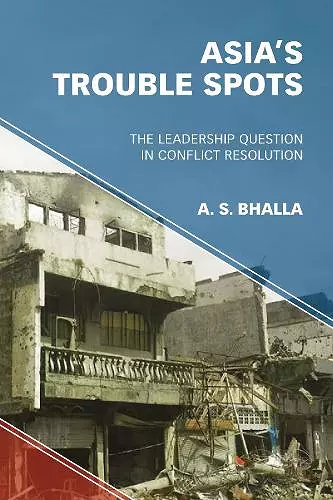Asia’s Trouble Spots
The Leadership Question in Conflict Resolution
Format:Hardback
Publisher:Rowman & Littlefield International
Published:16th Sep '19
Currently unavailable, and unfortunately no date known when it will be back

The art of successful negotiations over protracted conflicts presupposes a political commitment to peace and a willingness to compromise, which are sorely lacking in the current disorderly world. Part of the blame for this lies in weak and ineffective national and global leadership. This book’s sharp focus on the role of leadership at different levels—national government, rebel and Western/regional government mediators—as well as that of the UN and non-governmental players in settling intra-state disputes, is a unique feature which sets it apart from others. Much of the existing literature does not adequately discuss the role of the above actors in developing countries. Asia’s Trouble Spots is a serious attempt to fill this gap. The seven country studies in Asia—Myanmar, Indonesia, Philippines, Thailand, Sri Lanka, India and China—discuss, inter alia, how peace negotiations between national political and rebel leaders have unfolded. The role of state-sponsored cross-border terrorists and non-state spoilers such as Al-Qaeda and ISIS is addressed in the context of geopolitical rivalry among regional and global powers. A. S. Bhalla challenges the view that Western leaders can act as impartial mediators in intra-state and inter-state disputes. With few exceptions, their record has been dismal at best. Their failure in conflict resolution arises from a loss of moral authority and credibility, which follows the gradual erosion over the years of such liberal values as the rule of law and respect for democracy and human rights. Commercial and strategic self-interests have also tended to undermine peacebuilding efforts.
Using an excellent selection of case studies, A. S. Bhalla provides a helicopter view of Asia’s trouble spots with a sharp focus on leadership at all levels, rebels, and national government as well as regional and international communities. In doing so, he fills an important niche in conflict resolution scholarship. -- Zulfan Tadjoeddin, Senior Lecturer in Development Studies, Western Sydney University
This book helpfully focuses on a number of Asian conflicts, some well-known, others less so, and how they were (or were not) resolved. This is important for several reasons: Asia is the rising continent of the 21st century, and many of its countries are beset by internal tensions and outright conflicts sometimes fuelled in part by neighbouring states. The pattern is not likely soon to abate. Therefore, studying both the Asian failures and the successes identified in the volume makes a very useful contribution to the literature, and to practitioners of diplomacy and mediation, relative to a major continent in which the issues are relatively pervasive. -- David M. Malone, United Nations Under-Secretary-General, Rector of the United Nations University, Tokyo
This admirable book should be read by anyone concerned with both the changing nature of international politics and the enduring problems of conflict resolution. Written in clear and accessible prose it makes an important contribution to our understanding of some of the most intractable regional disputes in Asia. The author demonstrates convincingly that while an unstable geo-political situation bears some responsibility, conflict resolution has also repeatedly failed because of poor leadership on both sides of these conflicts and at all levels. -- James Mayall, Emeritus Sir Patrick Sheehy Professor of International Relations, University of Cambridge and Fellow of the British Academy
This brilliant book can be summarized as timely, perceptive and wide-ranging. A.S. Bhalla is master of his subject, with deep knowledge of, and sensitivity towards the history and ethnic minorities of Asia, as well as theories and practice of leadership. His comparative approach splendidly explicates the complex ethnic and other problems and issues facing much of Asia. Strongly recommended. -- Colin Mackerras, Professor Emeritus, Griffith University, Brisbane
ISBN: 9781786608369
Dimensions: 228mm x 160mm x 25mm
Weight: 549g
256 pages